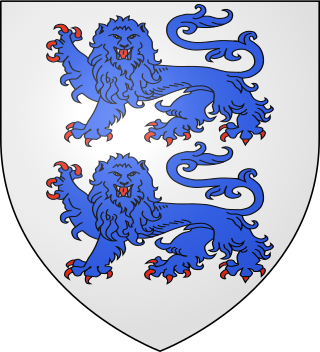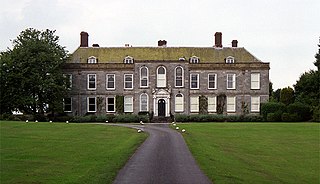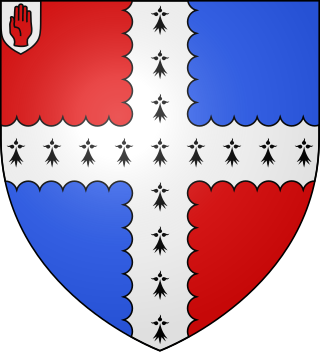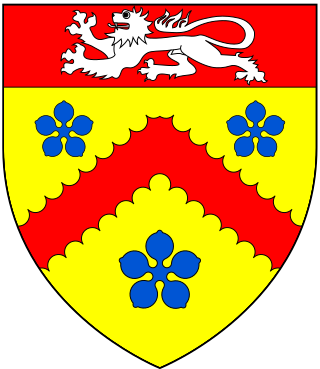
There have been three baronetcies created for members of the Bacon family, all in the Baronetage of England. As of 2008, one creation is extinct and two of the creations are extant. The extant titles have been merged since 1755.

There have been two baronetcies created for members of the Hanmer family of Flintshire, Wales, one in the Baronetage of England and one in the Baronetage of Great Britain. Only one creation is extant as of 2008. The third Baronet of the second creation was elevated to the peerage as Baron Hanmer in 1872, a title which became extinct in 1881. The family name derived from the manor of Hanmer in the Diocese of St. Asaph.

Sir Edward Acton, 1st Baronet was an English MP for Bridgnorth and High Sheriff of Shropshire, who supported Royalist cause during the English Civil War.

The Bunbury Baronetcy, of Bunbury, Oxon and Stanney Hall in the County of Chester, is a title in the Baronetage of England. It was created on 29 June 1681 for Thomas Bunbury, Sheriff of Cheshire from 1673 to 1674 and the member of an ancient Cheshire family. His grandson, Henry, the third Baronet, and great-grandson, the fourth Baronet, both sat as Members of Parliament for Chester. The latter died unmarried at an early age and was succeeded by his younger brother, the fifth Baronet. He was a clergyman. On his death in 1764 the title passed to his eldest son, the sixth Baronet. He represented Suffolk in the House of Commons for over forty years but is best remembered for his marriage to Lady Sarah Lennox. He died childless in 1821 and was succeeded by his nephew, the seventh Baronet. He was the son of Henry Bunbury, younger son of the fifth Baronet. The seventh Baronet was a distinguished soldier and politician. His eldest son, the eighth Baronet, was High Sheriff of Suffolk in 1868, and Fellow of the Royal Society. He died childless in 1886 and was succeeded by his younger brother, the ninth Baronet. He was Liberal Member of Parliament for Bury St Edmunds. He died unmarried in 1895 and was succeeded by his nephew, the tenth Baronet. He was the son of Colonel Henry William St Pierre Bunbury, third son of the seventh Baronet. He served as High Sheriff of Suffolk in 1908 and was a Deputy Lieutenant of the county. On his death in 1930 the title passed to his son, the eleventh Baronet. He was High Sheriff of Suffolk in 1936 and was a Deputy Lieutenant of the county. His son, the twelfth Baronet, was High Sheriff of Suffolk in 1972. As of 2014 the title was held by the latter's second but eldest surviving son, the thirteenth Baronet, who succeeded in 1985.
Sir Isaac Astley, 1st Baronet was an English baronet.

There have been three baronetcies created for persons with the surname Chichester, one in the Baronetage of England and two in the Baronetage of the United Kingdom. Only the 1641 creation is extant.

The Berney Baronetcy, of Park Hall in Reedham in the County of Norfolk, is a title in the Baronetage of England. It was created on 5 May 1620 for Richard Berney, Sheriff of Norfolk in 1622.
There have been six baronetcies created for persons with the surname Thomas, three in the Baronetage of England, one in the Baronetage of Great Britain and two in the Baronetage of the United Kingdom. Two of the creations are extant as of 2016.
Three baronetcies were created for persons with the surname D'Oyly, two in the Baronetage of England and one in the Baronetage of the United Kingdom. One creation is extant as of 2008.
There have been three baronetcies created for persons with the surname Hare, one in the Baronetage of England and two in the Baronetage of the United Kingdom. One creation is extant as of 2007.
There have been four baronetcies created for persons with the surname Preston, two in the Baronetage of Nova Scotia, one in the Baronetage of England and another in the Baronetage of the United Kingdom.
There have been two baronetcies created for members of the Boughton, later Rouse-Boughton family, one in the Baronetage of England and one in the Baronetage of Great Britain.

The Every Baronetcy, of Egginton in the County of Derby, is a title in the Baronetage of England. It was created on 26 May 1641 for Simon Every, Member of Parliament for Leicester in 1640 and a supporter of the Royalist cause in the Civil War. Born into the Every family of Dorset and Somerset, and a cousin to the Brice family of Somerset, he married Anne, daughter and co-heir of Sir Henry Leigh, of Egginton, Derbyshire. After his marriage, Every settled at Egginton.

There have been three baronetcies created for persons with the surname Style, one in the Baronetage of Ireland and two in the Baronetage of England. Two of the creations were in favour of the same person. As of 2014 one creation is extant.
The Colt Baronetcy, of St James's-in-the-Fields in the Liberty of Westminster in the County of Middlesex, is a title in the Baronetage of England. It was created on 2 March 1694 for Henry Colt, Adjutant to Prince Rupert of the Rhine and member of parliament for Newport and Westminster. The title was created with remainder to his younger brother John Dutton Colt, Member of Parliament for Leominster. Sir Henry died childless and was succeeded according to the special remainder by his great-nephew, the second Baronet. He was the grandson of John Colt.

There have been three baronetcies created for persons with the surname Cooke, two in the Baronetage of England and one in the Baronetage of Ireland. One creation is extant as of 2013.

There have been three baronetcies created for members of the Sedley family of Kent, all in the Baronetage of England. All three creations are extinct.
The Playters Baronetcy, of Sotterley in the County of Suffolk, was a title in the Baronetage of England. It was created on 13 August 1623 for Thomas Playters and was one of the last baronetcies created by King James I. The second Baronet was Vice-Admiral of Suffolk between 1640 and 1649. The fifth Baronet served as High Sheriff of Suffolk in 1728. The title became extinct on the death of the eighth Baronet in 1832.

There have been two baronetcies created for members of the Gawdy family, both in the Baronetage of England. Both creations are extinct.
There have been two baronetcies created for persons with the surname Garrard, both in the Baronetage of England. Both creations are extinct.











